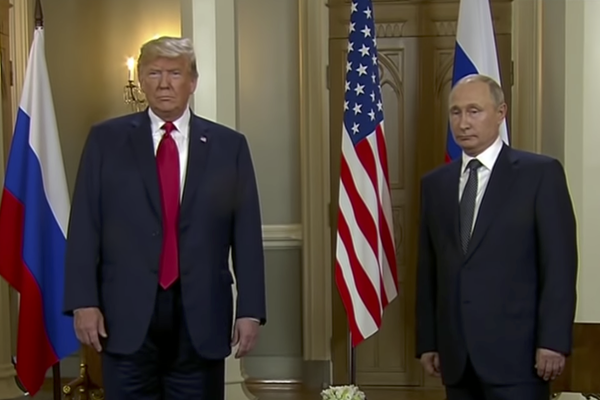George Orwell and Why the Time to Stop Trump is Now

As evidence of Hitler’s intentions crystalized in the 1930’s, many politicians who recognized the danger continued to vote against vital defense expenditures. George Orwell, reflecting on that and other cases of “ignoring facts which are obvious and unalterable,” concluded: “To see what is in front of one’s nose needs a constant struggle.”
Until Germany invaded Poland in 1939, there was room for wishful thinking regarding Hitler’s plans. Current defenders of the American Republic, by contrast, confront the “obvious and unalterable” fact that an assault has already been launched. The Mueller report puts in front of our noses Russia’s “sweeping and systematic,” interference in the 2016 election, its perception that “it would benefit from a Trump presidency,” its work “to secure that outcome,” and the Trump campaign’s expectation “that it would benefit electorally from information stolen and released through Russian efforts.”
Everyone able and willing to distinguish facts from lies has witnessed Trump’s brazen cover-up of Russia’s attack. He has never named or denounced the aggressor, while depicting the investigators as traitors who used a hoax to attempt a coup.
As November 3, 2020 approaches, Trump ignores calls to defend the elections and fails to confront Russia, inviting more cyber-sabotage on his behalf. What if he loses nonetheless? Consider a playscript whose author casts himself as defender of the nation against the “globalist elite” and their “deep state” henchmen. In Act I, he miraculously outwits their attempt to rig the 2016 election; in Act II he thwarts their attempted coup. Act III completes the plot, as the Democrats manage to fake a 2020 victory, only to face a resolute President who—having forewarned of a final deep state conspiracy to regain power—announces a state of emergency.
Better outcomes are possible, but inaction based on rosy predictions invites deepening danger. Time is passing, as it did in the weeks following President Obama’s discovery of Russia’s attack, and as it did while we waited for Mueller. Investigators continue to investigate what they already know. The Republican conscience does not stir. The Republican base is unmoved. The “investigation” of the investigators begins. The “coup plot” reverberates across cable news and Twitter. We watch—or don’t—an unfolding illustration of Orwell’s “plain, unmistakable facts being shirked by people who in another part of their minds are aware of those facts.”
Devoted to preserving human liberty, Orwell probed democracy’s vulnerabilities. In Animal Farm he depicted naïve disbelief in the face of step-by-step descents into despotism; in a 1940 review of Mein Kampf, he showed how ordinary people surrender freedom willingly; in 1984 he depicted how authoritarian control can be strengthened by technologies of mass communication and surveillance.
Orwell did not live to witness the liberal complacency that set in following defeat of the 20th century’s totalitarian movements. Nor could Orwell have imagined the new dangers posed by the cyberage. The treasonous implications of presidential indifference to Pearl Harbor or 9/11 would have been obvious to all. Our “cyber-Pearl Harbor,” by contrast, inflicted grave damage invisibly and non-violently, enabling its perpetrator and chief beneficiary—Putin and Trump—to deny its occurrence. Demagogic big lies can now metastasize through the body politic with lightning speed.
We struggle to understand this latest rise of authoritarian nationalism, envisioning policies that will progressively drive such movements back to humanity’s dark margins. But first we must remove a particular enemy from his position as the most powerful man on earth.
When freedom’s heartland was last endangered, FDR did not await favorable opinion polls to affirm—against the original “America First” movement—that America must fight to defeat fascism. Nor did Winston Churchill, though long ignored, refrain from insisting that his country face the Nazi danger. Those leaders matched Hitler’s faith in the “triumph of the will” with an even fiercer will to defend the liberal democracies.
Today, with America’s “bully pulpit” in the hands of a demagogue, defenders of our 230-year-old Constitution have to win for themselves the constant struggle to face what is in front of their noses. Aware citizens must stand up to insist that aiding and abetting a foreign attack, and depicting as traitors those who rise to “the common defense,” are high crimes that must be stopped and punished. Democratic leaders will not find their voice, nor Republicans awaken to the truth, until they sense the rising tide of mobilized American patriotism.
The test we face is to stop “shirking” in the face of “obvious and inalterable” facts, to focus fearlessly on the danger rather than allow a parade of doubts and distractions to displace what is “in front of one’s nose.” From 1776 to the fall of the Berlin Wall, believers in human freedom and democratic self-governance have known when to shrug off setbacks and summon their will. That time is now.